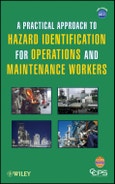Chapter 3 deals with the use of the basic human senses for identifying hazards.
Chapter 4 deals with different classes and categories of hazards.
Chapter 5 deals with techniques and methodologies for identifying and evaluating hazards.
Chapter 6 deals with making risk based decisions.
Chapter 7 deals with follow-up and call to action.
Chapter 8 deals with learning and continuous improvement.
The Appendices provide references, case studies, hazard presentations and additional pictures.
Note: CD-ROM/DVD and other supplementary materials are not included as part of eBook file.
Table of Contents
Preface xi
Acknowledgment xiii
Items on CD xv
1 INTRODUCTION i
1.1 Intended Audience 9
1.2 How to Use This Book 11
1.3 References 12
2 BASIC CONCEPTS 13
2.1 Hazard and Risk 14
2.2 Accident Model 16
2.3 Physical and Process Hazards 17
2.4 Benefits of Hazard Identification 34
2.5 Hazards Types by Industry 34
2.6 References 43
3 IDENTIFY HAZARDS 45
3.1 Concept of Recognition 50
3.2 Basic Human Senses 51
3.2.1 Vision 53
3.2.2 Hearing 68
3.2.3 Smell 73
3.2.4 Touch 74
3.2.5 Taste 76
3.3 Relationship Between Senses and Higher Order Processes 76
3.4 Influence of Human Capabilities and Limitations on Hazard Identification 79
3.4.1 Visual Detection 79
3.4.2 Sound Detection 81
3.4.3 Odor Detection 81
3.4.4 Touch Detection 82
3.4.5 Hazard Recognition 82
3.5 What Causes Hazards? 84
3.5.1 Example 1 84
3.5.2 Example 2 87
3.5.3 Example 3 89
3.6 References 90
4 TYPES OF HAZARDS 93
4.1 Explosion Hazards 95
4.1.1 Reactive Explosion Hazards 95
4.1.2 Flammable Explosion Hazards 98
4.1.3 Physical Explosion Hazards 101
4.2 Chemical Hazards 105
4.2.1 Toxic Chemical Hazards 105
4.2.2 Fire Hazards Ill
4.2.3 Corrosive Chemical Hazards 116
4.3 Electrical Hazards 118
4.3.1 Shock/Short Circuit 118
4.3.2 Fire 121
4.3.3 Lightning Strikes 122
4.3.4 Static Electrical Discharge 122
4.3.5 Loss of Power 123
4.4 Excavation Hazards 124
4.5 Asphyxiation Hazards 126
4.6 Elevation Hazards 127
4.7 Thermal Hazards 130
4.7.1 Heat 130
4.7.2 Cold 132
4.8 Vibration Hazards ..132
4.9 Mechanical Failure Hazards 133
4.10 Mechanical Hazards 134
4.11 Corrosion Hazards 135
4.12 Noise Hazards 137
4.13 Radiation Hazards 138
4.13.1 Ionizing Radiation Hazards 138
4.13.2 Non-ionizing Radiation Hazards 139
4.14 Impact Hazards 140
4.15 Struck Against Hazards 142
4.16 Visibility Hazards 143
4.17 Weather Phenomena Hazards 144
4.17.1 Temperature Extreme Hazards 144
4.17.2 Hurricane 147
4.17.3 Flood 147
4.17.4 Wind 149
4.18 References 149
5 EVALUATE HAZARDS 151
5.1 Field Surveys 154
5.1.1 Behavior Observation 154
5.1.2 Facility Walkthrough Checklists 458
5.2 Pre-Job Assessments 164
5.2.1 Job Hazard Analysis 164
5.2.2 Pre-Job Planning and Permitting 175
5.2.3 Ad Hoc Risk Assessment 176
5.3 Facility Assessments 182
5.3.1 Preliminary Hazard Analysis 182
5.3.2 Critical Task Identification Analysis 190
5.4 Incident and Near-Miss Reporting 201
5.4.1 Hazard Trending and Analysis 202
5.4.2 Hazard Mapping 204
5.5 Hazard Identification and Analysis Training 206
5.6 References 207
6 MAKE RISK-BASED DECISIONS 211
6.1 Hazard Ranking 215
6.2 Understanding Risk 217
6.3 Risk Ranking 218
6.3.1 Severity 222
6.3.2 Hierarchy of Safeguards or Layers of Protection 223
6.3.3 Likelihood 228
6.3.4 Risk Ranking 230
6.3.5 Example 1 - Flammable/Explosive Hazard 231
6.3.6 Example 2 - Flammable Hazard 234
6.3.7 More Detailed Matrices 238
6.3.8 Similarities Between More Sophisticated Process Hazard Evaluation Techniques 238
6.4 References 240
7 FOLLOW-UP AND CALL TO ACTION 241
7.1 Safety Culture 242
7.2 Management Commitment 243
7.3 Employee Ownership 243
7.4 Implement an Effective Hazard Management Program 245
7.4.1 Written Procedures and Training 245
7.4.2 Resolving Recommendations for Risk Reduction 245
7.4.3 Concepts to Strengthen Protective Systems 247
7.5 Hazard Communication 249
7.6 Call to Action 251
7.7 References 252
8 LEARNING AND CONTINUOUS IMPROVEMENT 253
8.1 Case Study - Oil Refinery Fire, 2007 253
8.2 Importance of Managing Change 256
8.3 Published Accident Databases and Resources 261
8.4 Revitalizing Lessons Learned 262
8.5 Transfer of Knowledge 263
8.5.1 Identifying and Collecting Information 264
8.5.2 Storing Information 264
8.5.3 Transferring Information 265
8.5.4 Managing the Process 265
8.5.5 Applying What You've Learned 265
8.6 Learning from Incidents 267
8.7 References 269
List of Figures 271
List of Tables 277
Index 278








